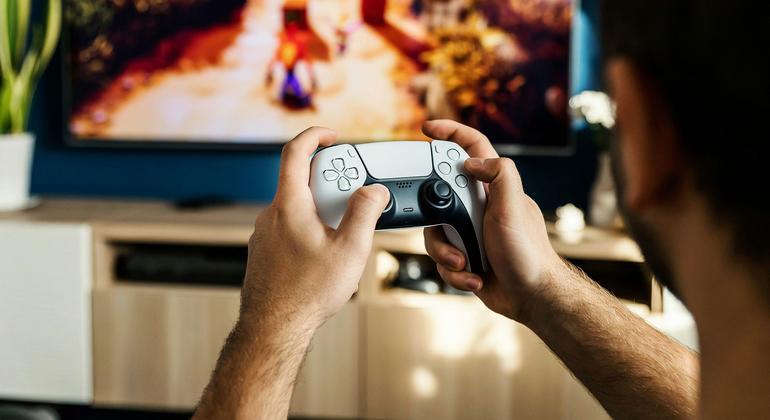‘New Quest Unlocked’: UN experts counter extremism in gaming spaces
 As millions unwrap new gaming devices this holiday season, UN experts are warning that these digital playgrounds need next-generation protection against extremist exploitation.
As millions unwrap new gaming devices this holiday season, UN experts are warning that these digital playgrounds need next-generation protection against extremist exploitation.
In an industry that has outgrown Hollywood in sheer monetary value – reaching $196 billion in 2023 – these digital platforms are becoming recruitment grounds for extremists, prompting an unprecedented collaboration between counter terrorism specialists and gaming companies.
To discuss the growing threat, UN News’s Sarah Daly sat down with Steven Siqueira, Deputy Director of the UN Counter Terrorism Centre (part of the counter-terrorism office, UNOCT) and Leif Villadsen, Acting Director of the UN Interregional Crime and Justice Research Institute (UNICRI).
The senior officials hosted a landmark event on the issue called New Quest Unlocked held earlier in December, which brought together gaming companies, policymakers and researchers to address violent extremisms in gaming spaces.
“The alarming trend has necessitated a collaborative research approach with the gaming industry and adjacent platforms,” Mr. Siqueira said, highlighting how extremist groups are increasingly targeting gaming spaces and adjacent platforms like Discord and Telegram.
This interview has been edited for length and clarity
UN News: Your joint event, New Quest Unlocked, brought together both UNICRI and UNOCT as well as gaming companies, policymakers and researchers. What prompted this collaboration?
Steven Siqueira: Last year in 2023, the gaming industry and adjacent platforms was a $196 billion industry. By comparison the movie industry was about 40 billion, so it’s five times the size of the movie industry.
Young people are being reached by terrorists and violent extremist groups through these platforms, with propaganda videos increasingly appearing across Discord, Telegram and Tiktok. This alarming trend necessitated collaborative research and working together with the gaming industry, adjacent platforms and of course, our members and member governments.
UN News: Recent intelligence reports suggest the threat level is higher than previously understood. What exactly are you seeing?
Steven Siqueira: While gaming has many positive aspects in terms of social interaction around the world – there’s also increasing risk that terrorists and violent extremist groups are using these platforms and the gaming adjacent platforms to get their message out.
The findings are stark: in Australia alone, approximately one in five counter-terrorism cases now involve young people, with gaming platforms playing a role in every investigated case.
Soundcloud
UN News: These findings challenge common perceptions about gaming platforms. How has the landscape evolved?
Steven Siqueira: The industry is not only open to young people. Increasingly, the average age of gamers is about 30-35 and it’s much more gender balanced than it has been in previous years.
UN News: Your research focuses particularly on Africa’s gaming market. Why is this region so crucial in understanding future challenges?
Leif Villadsen: Africa has indeed become one of the fastest growing markets for mobile games. With an unprecedented 11 per cent year-over-year growth rate, the continent represents both an extraordinary opportunity and a potential vulnerability.
We aim to better understand the industry, the community, the tactics used and the gaps and challenges in our own understanding of this threat across the continent.
UN News: You’re developing something called ‘gaming intelligence’ as part of global prevention strategies. How will this transform digital security?
Leif Villadsen: Gaming intelligence is focused on carrying intelligence from open-source platforms like in games, chats and social media to track extremist content and recruitment activities. This intelligence information will inform early warning systems help to detect and prevent radicalisation at an early stage.
UN News: How crucial is artificial intelligence to these global prevention measures?
Leif Villadsen: Given the size of the ecosystem, we are looking to develop and deploy advanced content moderation tools, with AI-based tools. However, the gaming community is filled with personalities with large followings so, we want to avoid any type of takedowns or massive actions which could be counterproductive and seen as suspicious by gamers.
It is crucial that we work with the gaming community, private sector companies and with gamers themselves, including young women and men to educate and build resilience across the community.
UN News: As we look toward 2025, what concrete outcomes, will make gaming spaces safer?
Leif Villadsen: By creating shared global standards and encouraging collaboration between governments, tech companies and civil society, we can provide a framework for addressing these threats in a more coordinating manner.
Steven Siqueira: The Global Digital Compact recognises these dual realities of the digital age and calls for unified global commitment to ensure that digital spaces are safe, inclusive and aligned with human rights principles.
Ultimately, finding the right actors in the gaming system – those who have a voice, but who are also open to understanding what the threat is and where to mitigate and how best to mitigate threats, could really help us strengthen and make the gaming ecosystem more resilient to violent extremism.



